Politics
2026 Elections: Security, Ugandans say no to crime
During the survey, respondents said insecurity was their topmost concern with 55.4% of the respondents citing lack of general security and instability as their primary fear.
The findings point to a strong demand for improved law enforcement, community policing, and conflict resolution mechanisms to restore safety and social cohesion in affected areas.
By: Nelson Mandela Muhoozi, Journalists @New Vision

THE CITIZENS' MANIFESTO
From a war-torn country in the 1970s and early 1980s, Uganda has transformed into a model of peace and security in the region.
The economy operates day and night, thanks to the efforts of the respective joint security agencies. Uganda’s position as Africa’s leading refugee-hosting nation is linked to its long history of peace and stability.
The country currently hosts over 1.92 million refugees, including more than 500,000 who have arrived since 2022.
In 2025 alone, nearly 120,662 people from war-torn countries have sought refuge within Uganda’s borders. In all previous general elections, a candidate with strong capacity to guarantee security of people and property has literally sailed through.
Indeed, over the last 30 years, President Yoweri Museveni’s biggest advantage as a presidential candidate has been his track record in ensuring peace and security.
The issue of security will still be top among concerns of Ugandans in next year’s elections, according to a survey conducted by Vision Group between March and May 2025 to establish key concerns among the people.
Despite Uganda being an island of peace in a region dotted with conflict and wars, pockets of insecurity are still a serious concern in the country. Although the latest Police crime report shows a 1.5% drop in overall crime, cases of theft, insecurity, and robbery are still rampant.
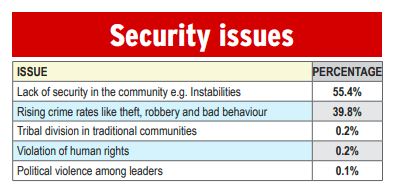
House break-ins were reported as a common occurrence from the survey.
Theft of crops and animals still give many people sleepless nights Enock Twinomugisha, a social worker and a professional master of ceremonies, was attacked at the entrance of his home at 11:40pm on July 22, 2025.
As he pulled up at the gate to his residence near Bishop Stuart University in Mbarara, tragedy struck.
“Out of nowhere, two men armed with pangas emerged from a dark corner nearby,” Twinomugisha recalled from his hospital bed, adding: “I quickly shut the car doors, but before I could react further, one of them smashed the car window and tried to strike my head.”
In the ensuing battle, Twinomugisha sustained a deep cut on his neck, hands and legs. Bleeding and panicking, he threw everything he had in the car — valuables, documents and his bag — towards the attackers, hoping it would save his life.
Later, Good Samaritans came to his rescue and took him to Bwamaka Hospital on Kakoba Road.
“They say I’ll recover,” Twinomugisha says in a faint voice, forging a smile. Twinomugisha’s experience is not isolated.
According to him, he is the fifth person to be attacked in the same area in just one week.
Twinomugisha’s testimony represent concerns of many other victims who have lost their property and sustained injuries, including losing life to criminals.
Theft tops security concerns
During the survey, respondents said insecurity was their topmost concern with 55.4% of the respondents citing lack of general security and instability as their primary fear.
This was followed closely by rising crime rates, including theft, robbery, and anti-social behaviour, accounting for 39.8% of the respondents.
Less commonly cited but still notable are tribal divisions (0.2%), human rights violations (0.2%), and political violence (0.1%).
While theft and robbery dominated, other issues also emerged in the survey.
These were cattle rustling, especially in the Karamoja and Acholi sub-regions, drug abuse and gang activities (notably in Kampala and Jinja), human sacrifice (in Kaberamaido and Amudat), kidnappings and disappearances (in Lira and Kampala) and conflict between refugees and the host communities (in Palabek and Adjumani).
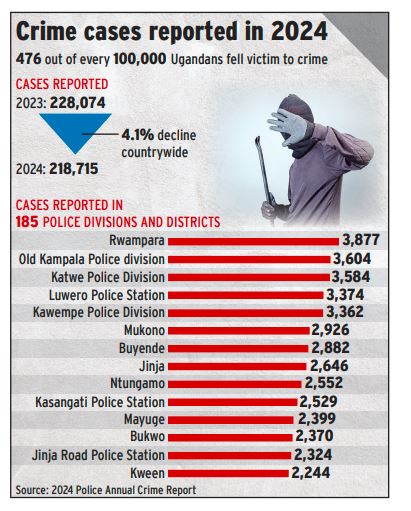
The findings point to a strong demand for improved law enforcement, community policing, and conflict resolution mechanisms to restore safety and social cohesion in affected areas.
At a national level, 44% of the voters cited theft in their area as a major concern, 21.7% mentioned insecurity in the community, while 8.3% are troubled by robbery.
Regionally, theft consistently dominated. In the central region, theft stood at 50.7%, insecurity at 19.6% and robbery at 6.7%. In the eastern region, theft, insecurity and robbery stood at 45%, 20.9%, and 8.3% respectively.
In northern Uganda, theft, insecurity and robbery stood at 41%, 28%, and 7.5%, respectively, while in the western region, the issues stood at 40.3%, 20.8%, and 10%, respectively.
In sub-regions such as Sebei, Karamoja and Acholi, cattle rustling, high robbery rates, and insecurity related to refugee settlements were prominently cited.
At the district level, Iganga recorded the highest level of concern among citizens regarding theft, with 85.7% of respondents identifying it as the most pressing security issue in their area.
Other districts where respondents reported theft as their top concern were Lira at 78.6%, Kitgum and Serere tying at 75%, Dokolo and Masaka tying at 71.4% and Kaabong at 70%.
Conduct of security personnel
The poll revealed troubling insights into the behaviour of some police officers and other security personnel.
In Lango sub-region, 4.9% of the respondents cited corruption in security services as a major challenge, while in Kampala, 6.7% of the respondents linked poor security to corrupt officers.
Reports of police colluding with criminals were also common in urban areas. The findings align with recent reports that highlight increasing complaints about bribery, illegal detentions, and excessive use of force.
In addition, the Inspectorate of Government has cited multiple cases where funds allocated to district police offices have been misappropriated.
Respondents, therefore, recommended the need for community policing units familiar with local dynamics, police presence in each parish or at least per sub-county, youth engagement to prevent gang recruitment, lighting in streets and public spaces, functional police hotlines and quick response units.
Such simple, low-cost interventions were viewed as more effective than distant, militarised solutions.

Police Cctv Cameras
Citizens' concerns
As Uganda moves closer to the 2026 general election, the citizens want more reassurance on dealing with the new trend of insecurity in villages and urban centres.
A survey conducted by Vision Group between March and May 2025 across 58 districts in 17 sub-regions paints a grim picture. Theft, insecurity, and robbery were among people’s concerns, and 15% of Ugandans demanded that national security be prioritised.
The survey, which covered 6,006 Ugandans, named other key concerns as health services (53%), education (35%), poverty and roads (29%), employment (19%), water and sanitation (16%), and food security (15).
Land access and energy concerns were cited by 8% and 13% of the interviewees, respectively, underscoring the need for improved public services and livelihood.
The survey targeted citizens aged 18 and above, with a valid national identity card.
Security budget up
In the 2024–2025 budget, the security budget was increased to address the funding gaps. The finance ministry allocated sh9.58 trillion to peace, security, and the rule of law.
This allocation increased in 2025–2026 to sh9.9 trillion. This budget has been dedicated to modernising and professionalising the armed forces, enhancing border security, supporting electoral security ahead of the 2026 elections, and improving the welfare of police and military personnel.
However, rural communities still face a shortage of police posts, police stations are understaffed, and their response is many times slow. Residents from Bukedi, Busoga, and parts of West Nile complained that police stations were often located far from villages, lacked transport, fuel, or even working communication devices.
One key issue repeatedly flagged in the survey was the limited presence of police in many areas.
In places like Sebei, Teso, and Bunyoro, respondents complained that criminals operated freely due to a lack of regular patrols and physical absence of police. Even in towns where police posts exist, respondents reported that Police officers were demanding bribes before responding to complaints.
They also reported delayed response to emergencies and inaction even after suspects are identified. “They only show up when there’s money involved,” said a Soroti market vendor, adding that such frustrations have led to increased mob justice, a sign of both desperation and lost faith in the security and justice system.
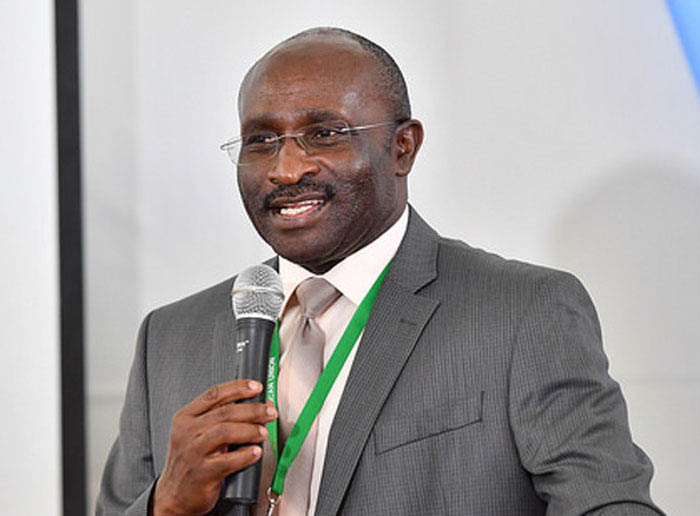
Simon Mulongo
Experts' views, recommendations
Experts weighed in with critical analysis on the root causes and possible solutions.
“If you think security is expensive, try insecurity,” remarked Simon Mulongo, a security expert and former deputy head of mission of the African Mission in Somalia.
He pointed to Uganda’s chronic understaffing of the police force. Mulongo noted that Uganda’s ratio of one police officer to approximately 1,125 citizens falls far below the recommended international standard ratio of 1 policeman to 400 people.
The current force of about 40,000 officers is grossly inadequate for a population of almost 46 million people, resulting in weak territorial presence by state security organs, Mulongo explained.
“The Police symbolise the presence of the state. Their absence leaves a vacuum that threatens both order and public trust,” he noted.
Mulongo warned that Uganda’s growing population of unemployed school dropouts and graduates — particularly those reliant on vulnerable sectors like subsistence agriculture —creates a fertile ground for criminal recruitment.
To counter this, he proposed a three-pronged approach — boosting recruitment into the Police force to match Uganda’s population demands, tackling socio-economic inequalities as well as moral and civic re-orientation.
Mulongo said socio-economic inequalities can be tackled through scalable programmes like the Parish Development Model and Emyooga. On moral and civic re-orientation, Mulongo is of the view that cultural and religious institutions can be involved to play a leading role, especially targeting youth.
He argued that moral decay is fuelling criminality, citing societies like China and Eritrea, where strong cultural ethics and family-based value systems deter everyday crime. Prof. Solomon Asiimwe, a political and international security relations analyst, challenged the narrow conceptualisation of security to be mistaken as being purely physical.
“Security is not just about guns and boots. It’s about jobs, dignity, and how fast justice is served.” He noted that poverty, high youth unemployment, and the sluggish response to crime reports are catalysts for insecurity.
Asiimwe said Uganda may not quickly bridge the police manpower gap, but that efficient co-ordination among security agencies and faster investigations would help restore public confidence.
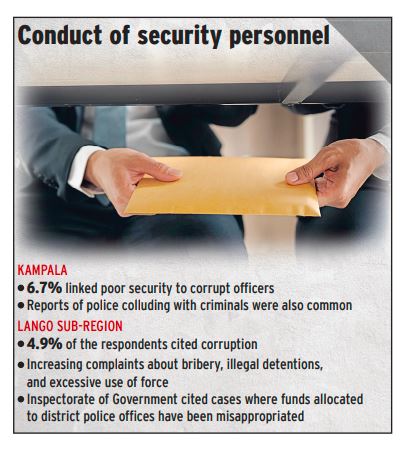
Asiimwe also called for the revitalisation of community policing, insisting that citizens must be seen and treated as co-creators of security. However, Asiimwe expressed scepticism about the state’s commitment to fighting corruption, which he said continues to drain institutional capacity.
“The President and the Inspector General of Government have shown willingness, but tangible outcomes remain elusive. Anti-corruption institutions must become truly independent and robust,” he emphasised.
Caleb Aluk, a security analyst with Mesh Consults Limited, focused on the structural design of Uganda’s security deployment, noting that while the President’s sub-county policing model was a step forward, it has left many parishes uncovered, thereby weakening community engagement.
“Centralising police posts at the sub-county level was a strategic mistake. It deprives communities of timely response and localised security.”
He recommended reintroduction of police posts at the parish level, revival of community intelligence networks, and enacting a national minimum wage to improve livelihoods and disincentivise crime.
Police response
Police spokesperson Rusoke Kituuma said the security situation in Uganda has generally improved over the years, although challenges remain. “Crime trends in Uganda show a steady decline.
In 2023, we registered a 1.5% drop in overall crime, and in 2024, that figure improved significantly to a 4.1% reduction. This is a clear indication that our interventions are yielding results,” he said.
“However, a decline doesn’t mean crime has been eradicated. It still exists — and varies from region to region.”
Kituuma acknowledges that theft remains the most prevalent crime, accounting for about 28% of all reported cases nationally.
“Kampala continues to lead in general theft cases. When it comes to motor vehicle theft, Katwe Division records the highest numbers. For motorcycle theft, Nansana tops the list. In cattle rustling, hotspots include Isingiro, Toro, and Kyenjojo,” he said.
Kituuma noted that while some crimes are easily detectable and preventable, others are more complex and often go unreported, until much later.
“For instance, a farmer may not monitor his cattle regularly. If his cow goes missing and he discovers it five months later, the delay severely limits our ability to intervene or recover the stolen livestock. In such cases, prevention also depends on the vigilance of the community,” he explained.
To respond more effectively, Kituuma said the Uganda Police Force has remodelled its community policing strategy, bringing services closer to the people.
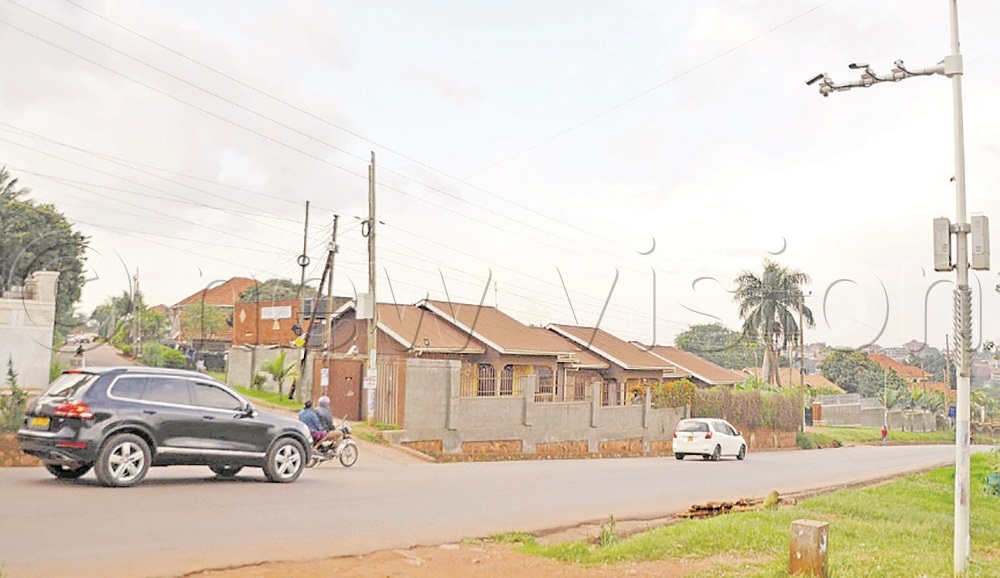
CCTV cameras on the Kiwatule-Naalya road in Kampala, installed with the aim of aiding the Police to reduce criminal activity.
“We have expanded our canine units and intensified their use in crime scene investigations. But beyond having dogs, we’re now using them strategically to improve our crime-fighting capacity,” he said.
“We’ve also deployed more officers at the sub-county level, where policing used to be thin. Under the new model, each sub-county is assigned at least 14 to 18 officers, compared to only two in the past. These include an Officer-in-Charge (OC), a Criminal Investigations (CID) Officer, a Community Liaison Officer, and intelligence personnel. Each unit is equipped with a counter phone and motorcycles. This has improved mobility and community engagement.”
Kituuma revealed that the police have also taken a tougher stance on economic crimes, targeting government wealth creation initiatives.
“We no longer release suspects on police bond if they are caught stealing wealth creation products like livestock, food crops, or cash crops. Such suspects must be taken to court as quickly as possible,” Kituuma stressed.
On technology, Kituuma said Closed Circuit Television (CCTV) camera surveillance continues to play a vital role in combating crime.
“The anti-crime infrastructure — especially CCTV cameras — is doing wonders. These systems are helping us track movements of vehicles, identify suspects, and respond faster to incidents. It’s a game-changer in urban crime control,” he said.
According to the 2024 police Annual Crime Report that was released in February this year, a total of 476 out of every 100,000 Ugandans fell victim to crime in 2024. The report revealed that a total of 218,715 cases were reported to police across the country, representing a 4.1% decline from 228,074 cases in 2023.
Among the 185 police divisions and districts, Rwampara district recorded the highest number of cases, with 3,877 crimes registered, followed closely by Old Kampala Police division (3,604 cases), Katwe Police Division (3,584 cases), Luwero Police Station (3,374 cases), and Kawempe Police Division (3,362 cases).
Other areas that registered high crime rates included Mukono (2,926 cases), Buyende (2,882), Jinja (2,646), Ntungamo (2,552), Kasangati (2,529), Mayuge (2,399), Bukwo (2,370), Jinja Road (2,324), and Kween (2,244).
On a monthly average, Police received 18,226 cases, with February (19,227 cases), April (19,045), and September (18,946), being the months with the highest number of crimes reported.
According to the Uganda Police Force, increased public co-operation and improved Police response were responsible for the drop in the crime rate.
Inspector General of Police Abas Byakagaba attributed the decline in crime to the active role of Ugandans in reporting offences and the Police force’s enhanced crime-fighting efforts.
“The public plays a crucial role in maintaining law and order. Their willingness to report cases has allowed us to respond more effectively,” Byakagaba stated, further noting: “We recognise and appreciate their contribution to this progress.”
Government's promise
While addressing a rally at Kololo Independence Grounds on July 20, 2025, President Yoweri Museveni reaffirmed that Uganda is secure and stable, noting that; “No one can bring war here.
“We have the strength and capacity.” However, he highlighted incidents of crime, citing the murder of the Entebbe couple — David Mutaaga, 69, and wife Florence, 62. The two, who had recently returned to Uganda after spending over three decades in Switzerland, were stabbed to death inside their home.
He criticised judicial corruption and pledged action: “I won’t allow judicial officers to release criminals illegally. Politicians must help us expose and follow up on such cases.”
Since his early days in power, Museveni has prioritised security. Throughout his tenure, major investments have been made in anti-terrorism, military modernisation, and regional stability.
The Government has boasted achievements, such as the defeat of the Lord’s Resistance Army rebels in the north, pacification of the Rwenzori region, and the arrest of foreign terror operatives in Kampala.
But while these victories may have stabilised the macro-security landscape, more still needs to be done to solve the micro-security problems plaguing everyday Ugandans.

Rusoke Kituuma
Voters’ voices
Francis Oluma, Soroti city
The security we are enjoying has facilitated us to do our work up to late. However, the Government should work on coming up with tough penalties for elements involved in criminality, by ensuring that they are given long sentences in prison.
Emmanuel Obedigum, Kole
With total peace in northern Uganda, people have rejuvenated their co-operatives, which were affected by the LRA insecurity.
Stephen Eyayu, Soroti district
I am impressed with the security of the region because as a bodaboda rider, I am able to ride at any time of the day and night, without being attacked..
Carol Kusima, Kabarole
Improving street lighting across Fort Portal City would significantly enhance security. Well-lit areas deter criminal activity and make it easier for both citizens and law enforcement personnel to monitor and respond to incidents effectively.
Sam Rukidi, Fort Portal
Leaders should consider rearming the local vigilante groups that once protected our villages. Since they were disarmed, there has been a sharp rise in theft, causing farmers to lose their livestock.
Robert Okullo, Alebtong
Security is now guaranteed under the National Resistance Movement government, especially from cattle rustlers, and the Government should not relax.
Some years back, people could not move freely because of insecurity caused by the Lord’s Resistance Army (LRA) rebels and the Karimojong cattle rustlers. As citizens, we appreciate the Government efforts since agriculture and other economic activities are now booming.
Emmanuel Twesige, Fort Portal
Recognising that security is a shared responsibility, the Fort Portal city leadership must work to strengthen co-ordination between security agencies and the citizens.
This can be achieved by establishing clear, accessible platforms for reporting crime and ensuring accountability when law enforcement personnel fail to act or do not follow due process.
Additional reporting by Godfrey Ojore, Patrick Okino, Jonan Tusingwire